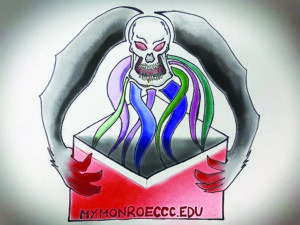
Spam can be dangerous. Not the meat in a can — spam emails.
Email is a powerful tool created in the 20th century, but every tool with good intentions can be corrupted or misused.
Jason Young, a system and security administrator, said spam is a broad term.
“Generally, when you say spam, you think of unsolicited emails from a legal or legit company or vendor,” Young said.
Emails containing information about classes or events are examples of harmless spam from legitimate sources.
“With my college email address, we do work with certain vendors and I get certain newsletters,” Young said, “and they in turn can sell my information to other people. So I get emails from all kinds of other vendors I’ve never even heard of. They’re still legit companies. I just don’t care to do business with them.”
Young said the point of newsletter spam emails are to get more sales and customer interactions.
“The more chances you take, the more hits you get,” Young said.
While these kinds of emails may be more annoying than dangerous, Young said phishing emails can also be grouped into the spam category.
Phishing emails are emails that appear to be from a legitimate company or individual, but with the intent to obtain personal information like social security and bank account numbers.
These emails may also contain links that house viruses and malware, which can wreak havoc on a person’s computer or cell phone.
To help prevent this from happening, students and staff are on two separate email systems.
“Right now, students use Office 365, which has its own spam filter that we utilize,” Young said. “Faculty and staff are using Exchange, which is a server we have on campus. For spam and virus (protection), we use Barracuda antivirus and spam filter.”
Barracuda is a vendor that sells spam and antivirus software.
While the filters are made to catch harmful emails, Young said they may sometimes stop a normal email coming from an unrecognized email account.
“It’s harder to find false negatives rather than false positives because it’s an email, and you don’t know where it’s going,” Young said. “It’s harder to find one that didn’t come rather than one that came and wasn’t supposed to.”
Another issue is when a filter occasionally does not catch a spam or dangerous email.
“People that write spam emails and malicious emails are always trying to find ways around spam filters,” Young said. “So they dissect the technology and figure out what the triggers are that catches them. It’s like an arms race.”
Young said if something makes it through Barracuda’s filter, IT can send it to the company as a sample.
The company can use the sample to add that email account to a spam list and enhance the software’s spam detection and catching capabilities.
To help figure out if an email is spam, Young said to look for bad grammar, odd requests or at the email address itself.
“If an email is supposed to come from a colleague and it’s from a Gmail address or something we’re not using at the college, (that) is a big sign,” Young said.
In October, students received an email about a dog-walking job opportunity.
The email asked students to respond using their personal email rather than their school account.
Young said it was a spam email that went unfiltered and had to be shut down by IT.
“I know about it, but it never happened to me,” said Nick Seccia, an MCMC student, about the dog-walking email.
Seccia said he only accesses his school email and uses it to check for assignments from teachers as well as event updates.
Julian Asher, another MCMC student, said he rarely checks his emails.
“If I see emails from people I know, I check it,” Asher said. “But if it is from companies, I ignore it.”
Asher said he also avoids clicking any links or attachments inside of emails from unfamiliar email addresses.
Young said the best advice is to delete suspicious emails or just ignore them.
If a student believes they have received a suspicious email, Young said he can review it. Students can forward emails to him at jyoung@monroeccc.edu.

